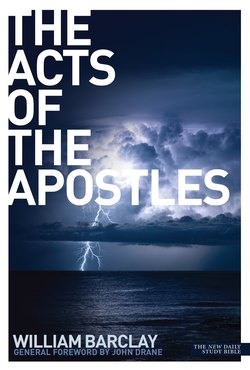Читать книгу The Acts of the Apostles - William Barclay - Страница 26
На сайте Литреса книга снята с продажи.
ОглавлениеTHE NOTES OF PREACHING
Acts 3:17–26
‘Now, brothers, I know that it was through ignorance that you did it, just as your rulers did. But God has thus fulfilled those things which he foretold by the mouths of all the prophets that his Anointed One should suffer. Repent, then, and turn so that your sins may be wiped out, so that times of refreshing may come to you from God, and so that he may send Jesus Christ who has already been preached to you. It is necessary that heaven should receive him until the times when all things shall be restored, times of which God spoke through the mouths of his holy prophets since the world began. Moses said: “The Lord, your God, will raise up from your brethren a prophet like me. You must listen to him in everything that he will say to you; and it will be that everyone who will not listen to that prophet will be utterly destroyed from the people.” And all the prophets who spoke from Samuel, and those who succeeded him, also announced the tidings of these days. You are the sons of the prophets and of the covenant which God made with your fathers when he said: “In your seed all the nations of the earth will be blessed.” It is to you first that God, when he raised up his son, sent him to bless you by making each one of you turn away from your evil deeds.’
ALMOST all the notes of early Christian preaching are sounded in this short passage.
(1) It begins with a note of mercy and warning combined. It was in ignorance that the Jews perpetrated the terrible deed of the crucifixion; but that ignorance is no longer possible, and, therefore, there can be no excuse for further rejection of Jesus Christ. This note of the terrifying responsibility of knowledge sounds all through the New Testament. ‘If you were blind, you would not have sin. But now that you say, “We see”, your sin remains’ (John 9:41). ‘If I had not come and spoken to them, they would not have sin; but now they have no excuse for their sin’ (John 15:22). ‘Anyone, then, who knows the right thing to do and fails to do it, commits sin’ (James 4:17). To have seen the full light of the revelation of God is the greatest of privileges, but it is also the most terrible of responsibilities.
(2) The obligation this knowledge brings is the obligation to repent and to turn. The two words go closely together. Repent might simply mean to change one’s mind; and it is an easier thing to change one’s mind than to change one’s life. But this change of mind is to result in turning away from the old way and making a new start.
(3) This repentance will have certain consequences. It will affect the past; sins will be wiped out. This is a vivid word. Ancient writing was upon papyrus, and the ink had no acid in it. It therefore did not bite into the papyrus like modern ink, but simply lay on top of it. To erase the writing, it was simply wiped away with a wet sponge; so God wipes out the sin of those who are forgiven. It will affect the future; it will bring refreshing times. Into life will come something which will be a strength in weakness and a rest in weariness.
(4) Peter goes on to speak of the coming again of Christ. Whatever else that doctrine means, it means that history is going somewhere.
(5) Peter insists that all that has happened has been foretold. The Jews refused to accept the idea of a chosen one of God who must suffer; but Peter insists that if they search their own Scriptures they will find it all there.
(6) Peter reminds them of their national privilege. In a very special sense, the Jews were God’s chosen people.
(7) Finally, he lays down the inescapable truth that that very special privilege brings very special duty. It is the privilege not of special honour but of special service.
